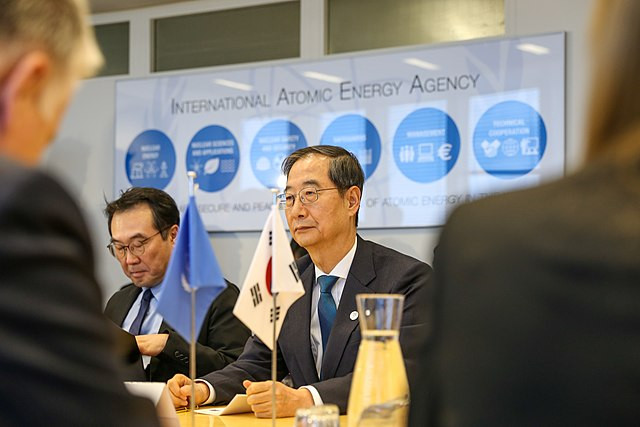South Korea's acting president Han Duck-soo resigned Thursday to pursue what he called a "heavier responsibility," confirming widespread expectations that he will launch a presidential campaign in the wake of President Yoon Suk Yeol's impeachment.
"I have two paths ahead of me. One is completing the heavy responsibility that I handle now. The other is putting down that responsibility and taking a heavier responsibility," Han said during a nationally televised address. "I've finally determined to put down my post to do what I can and what I have to help overcome the crises facing us."
Han, 75, is expected to announce his presidential bid officially on Friday and is likely to align with the conservative People Power Party, which has struggled to recover since Yoon's removal from office in April. The upcoming election, scheduled for June 3, was triggered by Yoon's controversial martial law decree and subsequent impeachment by the opposition-controlled National Assembly on December 14.
A veteran technocrat with a Harvard Ph.D. in economics and four decades of public service, Han has held top posts in both liberal and conservative governments, including as finance minister, trade minister, ambassador to the U.S., and twice as prime minister. Despite his lengthy resume, Han has never won elected office, prompting concerns among critics about his political support base and leadership profile.
The liberal Democratic Party, whose nominee Lee Jae-myung is the current front-runner, sharply criticized Han's resignation. "Only the people's severe punishment awaits Prime Minister Han Duck-soo, who is blind with greed and abandons state affairs," party spokesperson Cho Seung-rae said.
Han's departure formally takes effect at midnight, at which point Deputy Prime Minister Choi Sang-mok will assume the role of acting president until voters choose a new head of state in June.
Lee Jae-myung's campaign suffered a legal setback on Thursday when South Korea's Supreme Court ordered a lower court to revisit its decision to cancel his conviction for election law violations. Under South Korean law, a fine exceeding 1 million won (about $683) for such violations disqualifies candidates from holding office for five years.
The Democratic Party denounced the court's move as judicial interference, escalating tensions in an already heated campaign. The ruling conservative bloc, weakened by Yoon's impeachment, has seized on the Supreme Court's decision as a political opportunity to undermine Lee's candidacy.
Yoon, who declared martial law in December following mass protests, was formally dismissed by the Constitutional Court in early April. Han, who had been serving as acting president since Yoon's suspension, faced his own impeachment in December by opposition lawmakers accusing him of enabling Yoon's unconstitutional actions. However, the Constitutional Court overturned Han's impeachment in March.
Yoon is currently on trial for rebellion, and prosecutors on Thursday added charges of abuse of power, according to the Seoul prosecutors' office.






